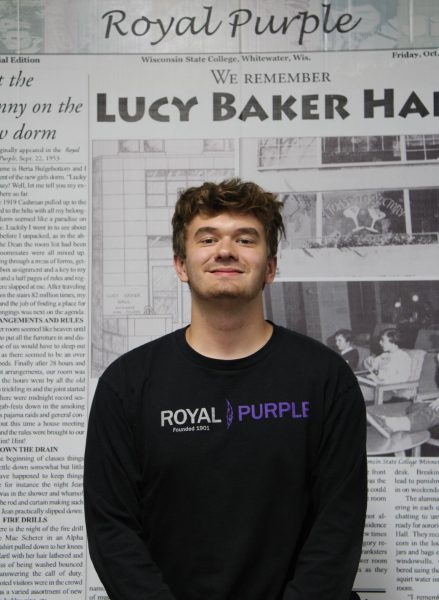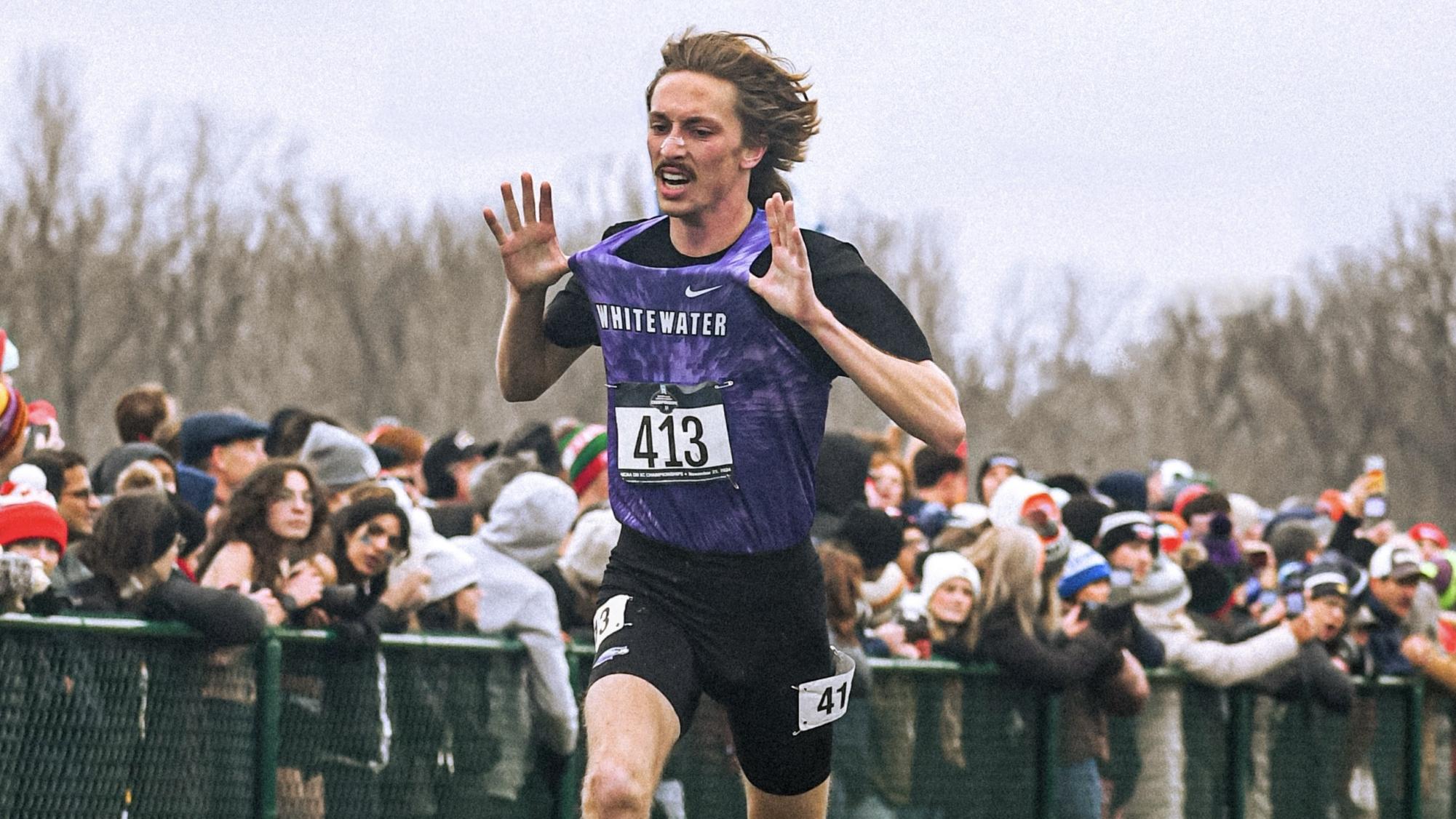
(Courtesy of Christian Patzka)
A 21-year-old Christian Patzka had just finished runner-up in the 2023 Division III Men’s Cross Country Championship for the second straight year.
Rival UW-La Crosse runner Ethan Gregg pulled away late in the race, crossing the finish line 18.3 seconds ahead. Despite becoming the second three-time All-American in UW-Whitewater cross country history, Patzka was devastated.
“The first time I got second, I was so happy, out of this world,” Patzka said. “The second time, it was a horrible day.”
Gregg, now a professional runner for the Hansons-Brooks Distance Project, approached Patzka after the race with a refreshing remark.
“He was telling me ‘I want you to know, every day, the work I put in is just so that I can try to beat you,’” Patzka said.
Gregg’s words capture only a fraction of the influence Patzka has on not just the Warhawk cross country and track and field programs, but Warhawk athletics as a whole. It is not easy to set a standard at a school full of athletic excellence, yet Patzka raises the bar.
However, Patzka does not want his success to put pressure on current athletes and incoming recruits. In his eyes, anyone has the capability to achieve what he did. Anyone can carve out their own Warhawk legacy.
“I’m not special,” Patzka said. “I want people to think they can put themselves in my shoes and they can also accomplish things that are this great.”
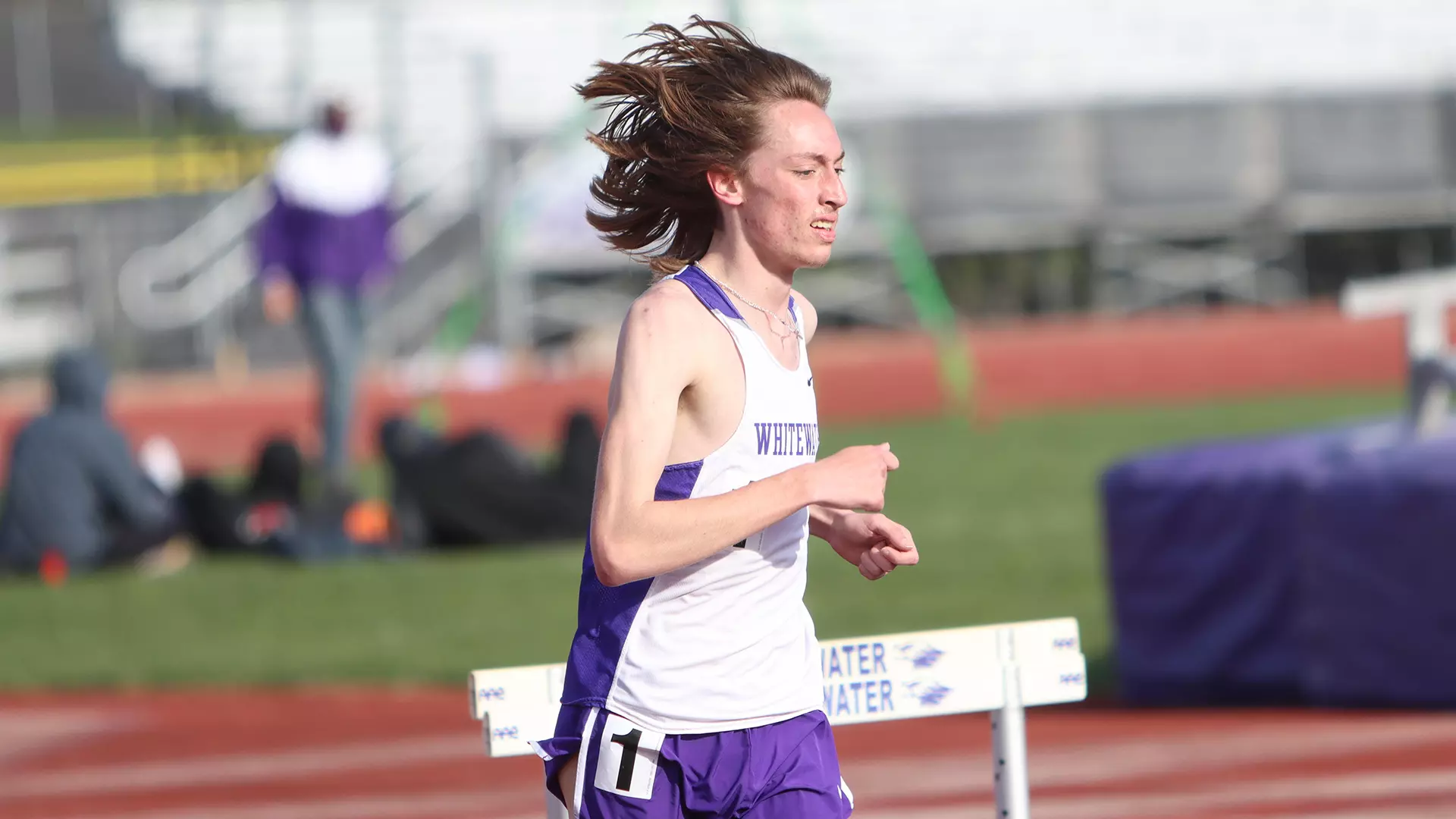
(Courtesy of UW-Whitewater athletics)
From the jump, Patzka began garnering national accolades. After his true freshman cross country season was canceled due to the COVID-19 pandemic, he took home All-American honors by placing seventh in the 3,000-meter steeplechase at the DIII Outdoor Track and Field Championships.
“Having that year of COVID-19 was a little bit of a blessing in disguise,” track and field head coach Mike Johnson said. “He got to kind of dry run a competitive season to see what it was like. He had a better footing for his development just because of that extra COVID year.”
Coming into college, Patzka thought he would be a “middle-of-the-line runner” where he would run for fun, then eventually graduate with a history degree. Nearly five years later, he has the opportunity to break the DIII record for most career All-American honors in events longer than 800 meters.
“We always have to kind of develop someone, it takes a while and they finally start getting better,” said Jeff Miller, cross country head coach for 43 years. “We’ve never had it happen where we get a guy who walks in the door really good, right off the bat can be an All-American.”
Some of his six national titles and 16 All-American honors stand out more than others. For example, his first career national title came during the 2023 outdoor track season, where he shattered the national meet record in the 5,000-meter run by more than 10 seconds. Furthermore, after finishing second place nationally in back-to-back cross country seasons, Patzka called his 2024 first-place finish “the most rewarding send-off I could have had.”
What rises above the accolades, though, is the overall influence that Patzka has on fellow Warhawk athletes. Behind the scenes, he is a leader by example with great demeanor, knowledge and willingness to build camaraderie.
“He does a good job of showing what he does and how hard he races and I think it gives others confidence to know that, ‘hey, I’m training with this guy,’” Miller said. “He’s confident without being cocky about it.”
Being a quiet leader does not translate to him being a quiet personality. His lack of cockiness allows for him to be approachable, something that has helped developed younger runners in the cross country and track and field programs.
“He’s very outgoing and he’s a big supporter of his team, but he’s just not someone that has to talk his way into people understanding how good he is,” Johnson said. “He just does that every day, day in and day out.”
Patzka completely flips the idea of arrogant athletes. The confidence is there, but according to his coaches, his competitiveness and coach-like leadership characteristics exceed any achievements.
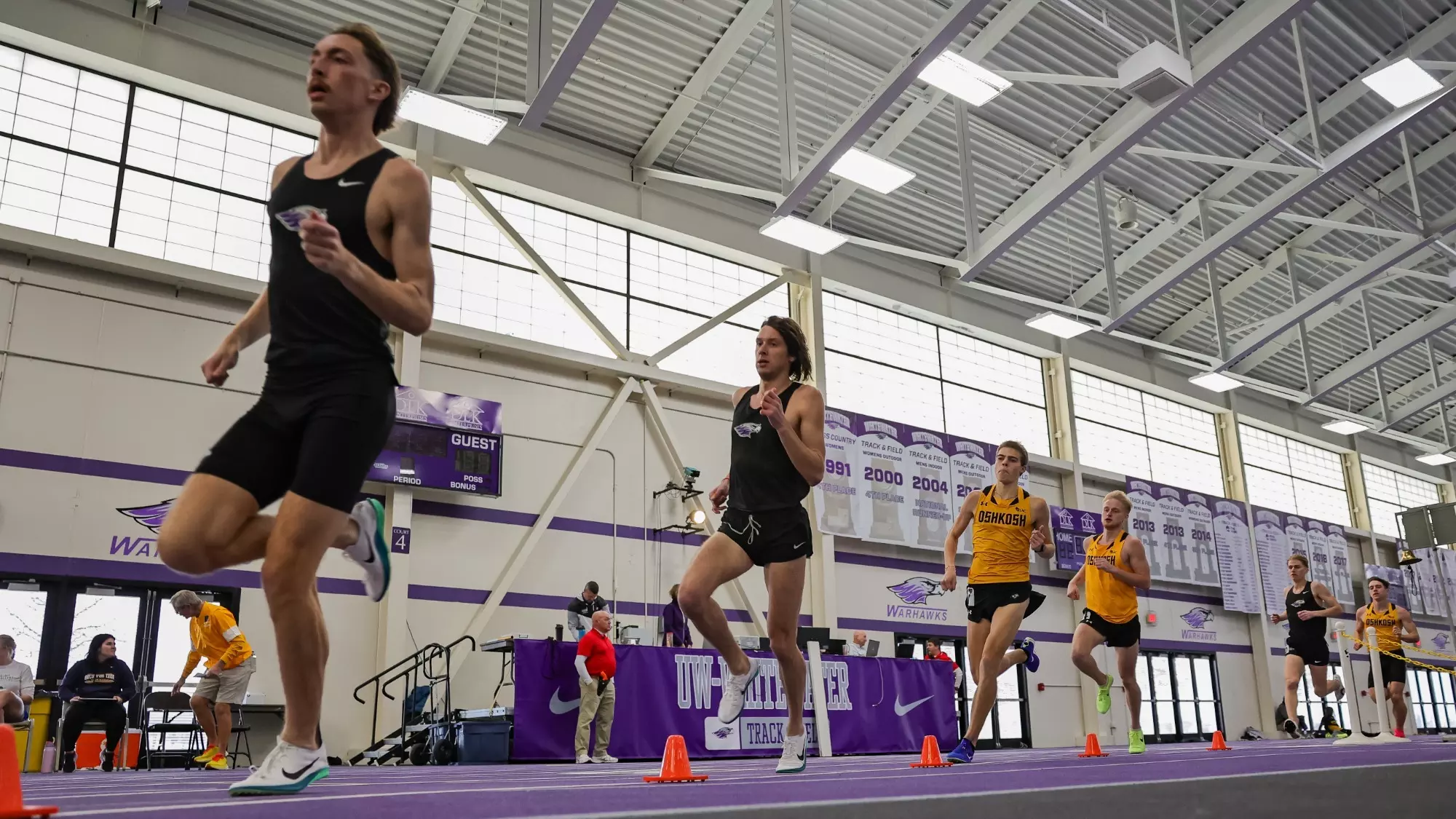
(Courtesy of UW-Whitewater athletics)
Patzka and his coaches recognize another essential factor in his development: fellow senior Gunner Schlender.
The dynamic duo has built off each other over the past five years. There is no denying the impact that Patzka has had on Warhawk athletics, but take Schlender out of the mix, there is no telling if either of them would have the same success without the other.
Fortunately for the cross country and track and field programs, that remains a what if.
“I can’t say enough about the guy,” Patzka said. “I have someone who is always going to be there and always be consistently working hard. He’s the one I’ve always come to appreciate.”
Their bond sparked at the 2019 Division 3 Wisconsin State Cross Country Championships, where Patzka and Schlender finished first and fifth, respectively. They learned that they were both seriously considering UW-W for collegiate athletics, and eventually, they committed to the school during the same weekend.
“I knew that was going to change us,” Miller said. “It became evident when they got here and they started training together, within the first few weeks, you’re like, ‘this is different.’”
Both athletes bring a similar influence to Warhawk athletics despite their sharply different running styles. Patzka is a speed-oriented runner who trains in shorter legs, while Schlender is a strength-based runner who puts forth 100-mile training weeks.
The contrast in training has greatly contributed to both runners’ development, allowing their relationship to grow through training.
“It works out perfectly,” Patzka said. “We strengthen each other’s weaknesses.”
Adding two star athletes in the same graduating class is a treat for coaches. Watching them grow into national-caliber runners has been even more rewarding.
“This is a once-in-a-lifetime experience that you get as a coach,” Miller said. “You’re never going to get opportunities to coach people like this more than once.”
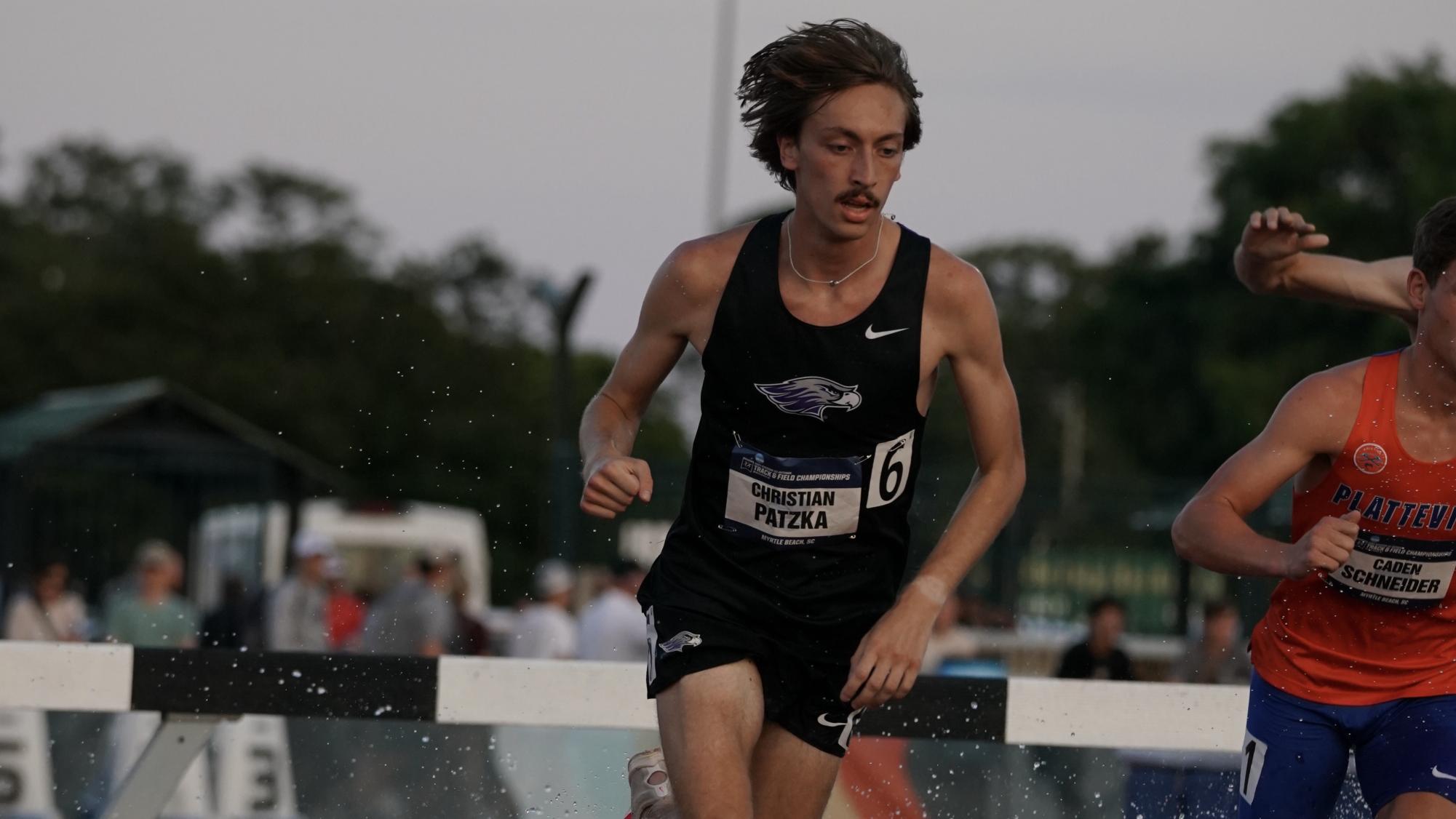
(Courtesy of Christian Patzka)
Following Patzka’s second steeplechase national championship May 25, 2024, his post-graduation plans changed drastically. Shortly after season’s end, he was presented with the opportunity to represent Team USA at the Olympic level, attempting to qualify for the Olympic Trials in Portland, Ore.
To automatically qualify for the Olympic Trials, athletes needed to run a time of 8 minutes, 30 seconds, or finish inside the top 30 finishers. Patzka finished 34th with a time of 8:31.89, narrowly missing out on the Olympic Trials. He was heartbroken, but also uplifted.
“It made me realize all of the people in front of me are 5-8 years older than me, or they’re Division I studs,” Patzka said. “It’s refreshing to know that I’ve been doing this event for four years, and I have a lot of life left in the sport.”
Fueled by a near-miss, Patzka will attempt to qualify for the 2025 World Athletics Championships – the “Olympic Trials in a non-Olympic year.” Likewise to Olympic qualification standards, he must run an 8:15.00 to qualify for Team USA.
Once the fall 2025 semester comes around, he will fulfill his student teaching accommodations with his eyes set on winter graduation. From there, his professional teaching and running careers kick off.
“One of my main goals is to see how well I can do at the U.S. level, and continue to travel across the country and race,” Patzka said. “There’s a lot of opportunity there, which is exciting, but also a little scary.”
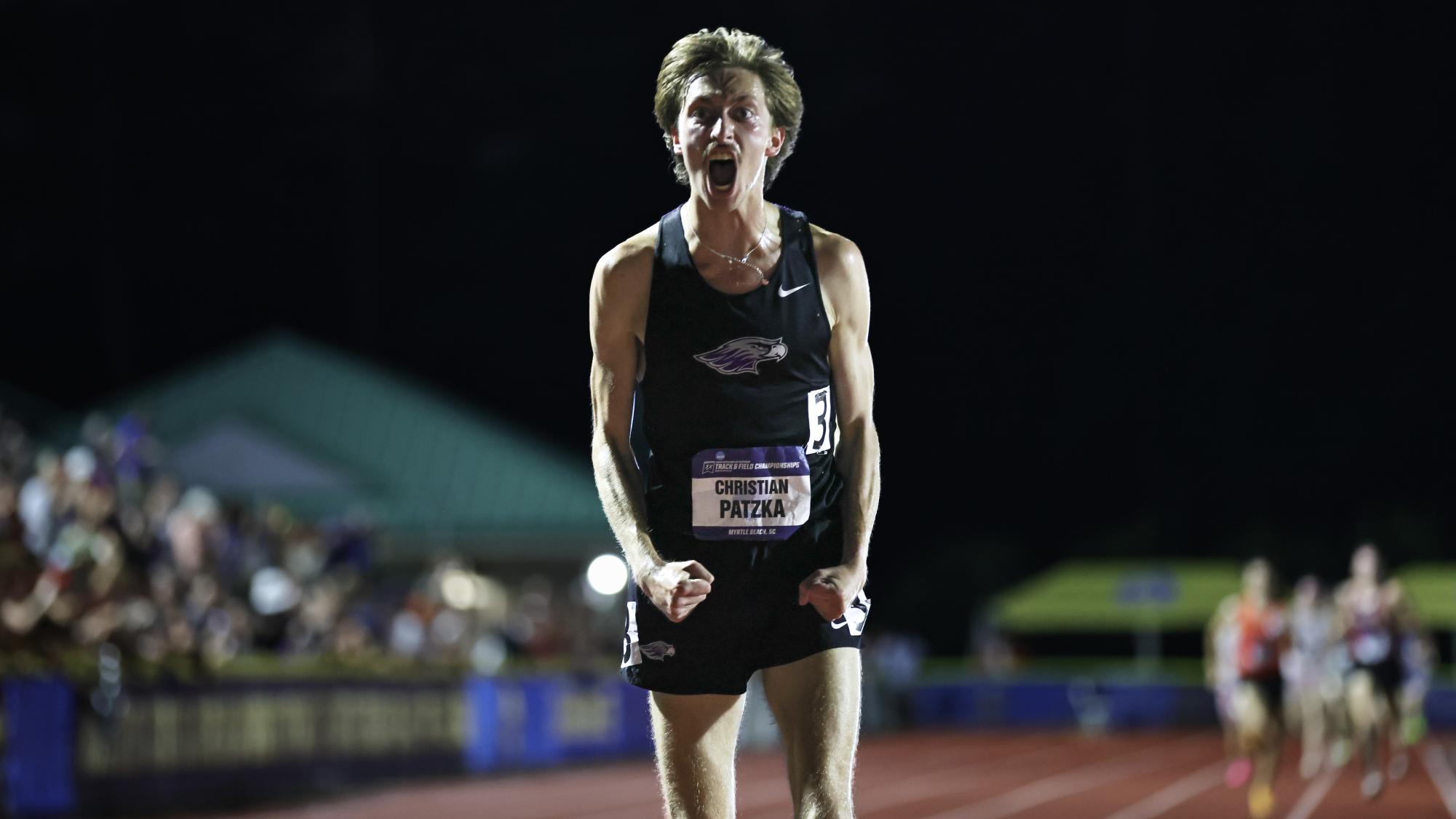
(Courtesy of Christian Patzka)
Patzka describes his story as one like any other, but it could not be further than ordinary. Raw talent was an obvious characteristic of Patzka when he joined the Warhawks, but the added work ethic and desire to improve brought him tremendous success.
“When the chips are down, and you see kind of the fire in his eyes, when he gets that look he’s not going to be beaten,” Johnson said. “No matter what, he’s got that extra kick and that extra gas in the tank.”
While talent and work ethic are important, Patzka credits the university’s support system for a lot of his success. From developing close bonds with teammates like Schlender and former runner Justin Krause, to the love received from his family, it is hard for him to imagine another way to run collegiately.
“I really want others to have these opportunities,” Patzka said. “I wouldn’t be able to do what I’ve done without the support system.”
Patzka could have left Whitewater to pursue Division I opportunities, where he would have likely received a full-ride scholarship with more opportunities to profit off his name, image, and likeness. During his Olympic Trials qualifying run, his 8:31.89 was faster than collegiate runners from the University of Michigan and Utah State University, and faster than professional athletes from the Atlanta Track Club, Roots Running Project and HOKA Aggie Running Club.
But to him, it was never about the money; it was never about the exposure. It was about forging relationships and running on his own terms.
“I didn’t want to take the easy way out and go to some team that would hand me everything,” Patzka said. “It’s also hard to leave when you have some of your best friends and your family in the state. I didn’t want to leave this behind.”
As generic as Patzka puts it, there is no doubt that his accomplishments will rub off on other Warhawk athletes. For decades to come, he will be known as one of the greatest athletes in school history.

